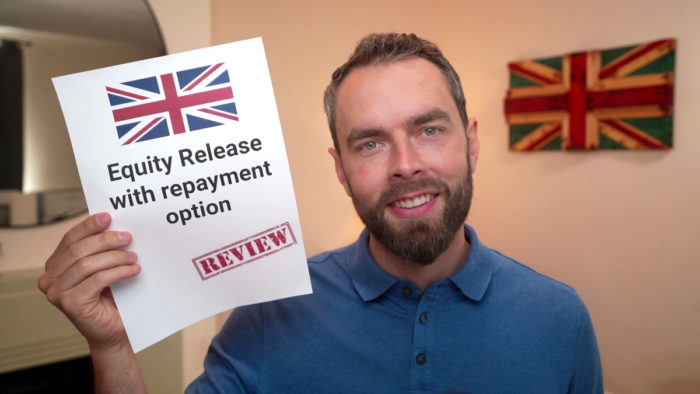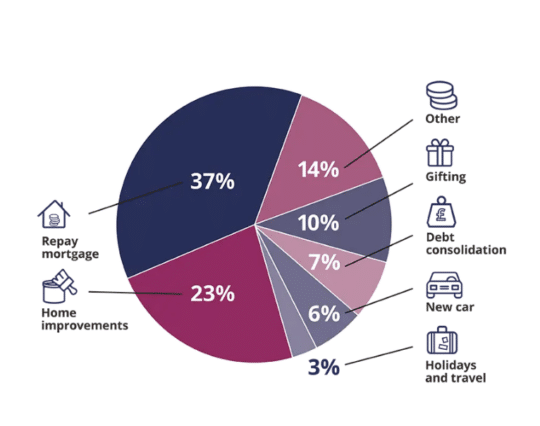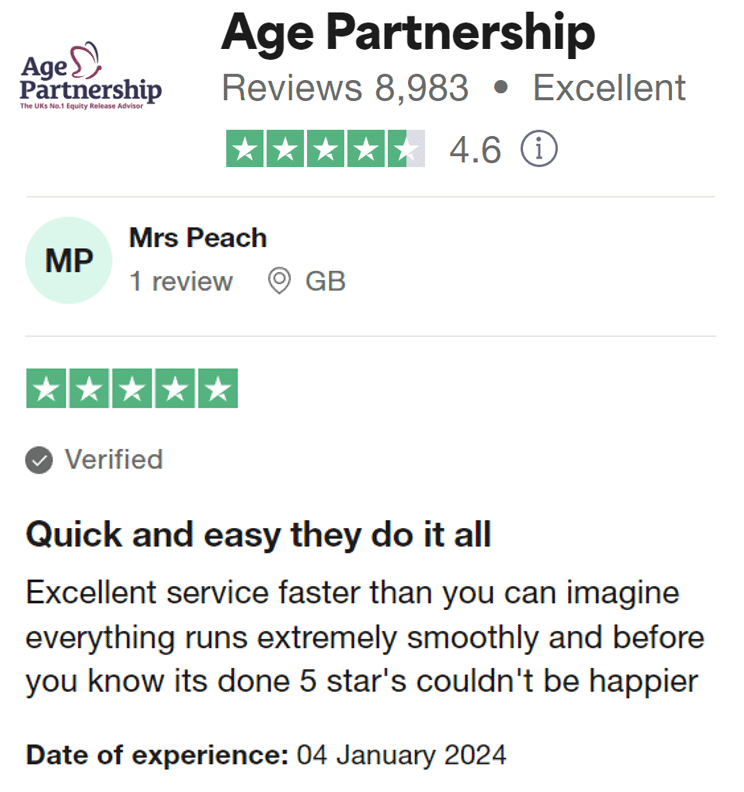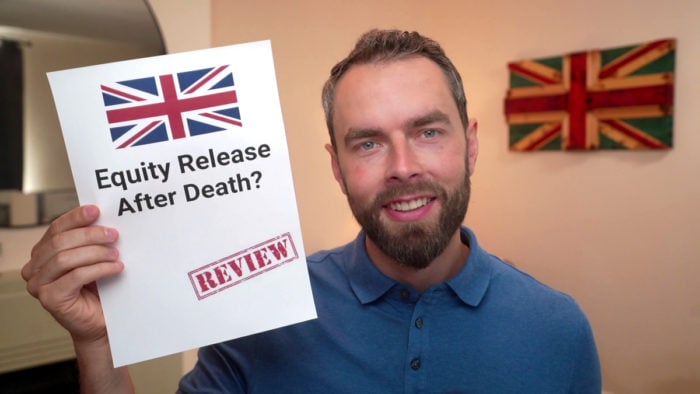Equity Release with Repayment Option – What You Should Know
Our preferred equity release adviser is Age Partnership. For free and impartial money advice you can visit MoneyHelper.

Our preferred equity release adviser is Age Partnership. For free and impartial money advice you can visit MoneyHelper.
Are you trying to understand equity release with a repayment option? This can be a tricky topic, but we’re here to make it simple for you.
Each month, over 7,000 people visit our website to get advice on equity release. We’re experts in this field, and we’re ready to share our knowledge with you.
In this article, we’ll cover:
- What equity release is and how it works.
- The risks tied to your home’s equity.
- How and when equity release needs to be paid back.
- The realistic quotes for equity release.
- The catches you should be aware of with equity release.
The Centre for Ageing Better found a million UK homes need improvements for comfortable living, with a third housing someone over 55.1 If you’re in that age bracket and contemplating equity release, understanding all its details becomes particularly crucial.
We know that equity release can seem tricky, which is why we’ve put together this guide to help you make the best decisions for your future. Let’s start this journey together.
Does equity release have to be paid back?
Equity release might not need to be paid back through monthly repayments, but the money the senior homeowner receives is still a loan and needs to be paid back, usually with interest.
The homeowner pays back the debt when their home is sold. The sale proceeds of their home are first used to pay back the lender.
However, the lender cannot force the homeowner to sell their home unless they move into long-term care. If they do not move into care, the home is sold from the homeowner’s estate after death.
This means equity release will eat up some of the inheritance you would have given to loved ones.
Equity Release Do’s and Dont’s
Before we explore the details of repayment, it’s essential to have a solid understanding of the do’s and don’ts of equity release. This ensures you can make informed decisions and navigate the process confidently.
To make things easier, I’ve put together a table outlining key guidelines to help you along the way. If you want to learn more about equity release, be sure to read our complete guide.
| Equity Release – DO… | Equity Release – DON’T… |
| DO Use equity release to fund sensible investments like home improvements, debt consolidation, helping family members. | DON’T Use equity release to invest in a risky scheme, to please family members pressuring you, to make a luxury purchase or holiday. |
| DO Seek professional advice from professionals who specialize in equity release. | DON’T Rush into a decision. Take your time, you are in control on this. |
| DO Understand the difference between lifetime mortgages and home reversion plans – and which is best for you. | DON’T Use equity release without fully understanding the terms. |
| DO Check for flexibility – look for plans that let you be flexible, like making partial repayments. | DON’T Forget to look at alternative options for raising funds. |
Can you make repayments on equity release?
Yes, it is possible to make repayments on your equity release plan and it is most common with lifetime mortgages. There is even a variation of a lifetime mortgage called a repayment lifetime mortgage that allows voluntary interest repayments.
Repayment lifetime mortgages
A repayment lifetime mortgage works exactly the same way as a standard lifetime mortgage, but it allows the homeowner to make voluntary interest repayments each month to keep the debt lower.
Because these interest repayments are voluntary, the homeowner can decide how much they wish to pay back and can change the amount each month in most cases.
Note that some lifetime mortgages allow voluntary repayments without specifically being called a repayment lifetime mortgage. This is also an equity release with a repayment option.
Other variations of a lifetime mortgage include a drawdown lifetime mortgage or an enhanced lifetime mortgage.
How equity release could help
More than 2 million people have used Age Partnership to release equity since 2004.
How your money is up to you, but here’s what their customers do…
Find out how much equity you could release by clicking the button below.
In partnership with Age Partnership.
How much interest do you pay back?
I’ve highlighted the significant interest rates associated with equity release before. The more you borrow, the higher these rates become. This can limit the benefits you get from the equity release.
The standard interest rate on lifetime mortgages ranges from 2-10% depending on the lender, the property and how old you are when you apply. The older you are when you apply the lower the interest rate usually is because logic suggests older people have shorter life expectancies, and thus, the credit agreement is less of a risk if the property will be sold sooner.
To put this in perspective, let’s use an example of a lifetime mortgage. If you want to take out £65,000 equity at a standard rate of 6.4%, and you have your lifetime mortgage for 12 years, the total debt will have grown to £137,000 if you make no voluntary repayments during the course of the mortgage.
Should you make voluntary interest repayments?
People choose to make voluntary interest payments on their equity release plan so the total debt is lower when the home has to be sold.
This is primarily done to ensure less of their estate is taken by the lender and more of it is directed to loved ones. This can be a good way of getting the money you need but also ensuring beneficiaries get more from you.
On the other hand, if you do not have anyone to leave your inheritance to or your beneficiaries are already wealthy, it may not be advantageous to make voluntary repayments.
Overall, the best way to answer this question is with personalised advice from an equity release advisor. Make sure to choose independent financial advice that is authorised and regulated by the Financial Conduct Authority.
Join thousands of others who release equity
Age Partnership have helped over 2 million people release equity from their home.

Mrs Wareham
“I am more than pleased to have taken out Equity Release with Age Partnership.”
Reviews shown are for Age Partnership. Search powered by Age Partnership.
Consider the negative equity guarantee
There may be situations when making voluntary repayments is not worth it, or is no longer worth it due to a guarantee that your lender has agreed to honour.
Lenders that are members of the Equity Release Council must commit to a negative equity guarantee. This guarantee states that lenders must not recover debts that exceed the property’s sale value.
So if the total debt is now greater than the property value – either because the debt has grown over many years and/or because the property value has decreased – they cannot try to collect the shortfall. In this situation, it would not be in the homeowner’s financial interest to keep making voluntary repayments.
Can you repay it early?
Lifetime mortgages and home reversion plans are both meant to last until you die or move into care. But it is still possible to exit the credit agreement at a cost.
Just how you can pay off a residential mortgage early, you can also pay off your equity release plan early. But in both cases, the homeowner will be hit with early repayment charges. These early repayment charges can be expensive.
» TAKE ACTION NOW: Find out how much equity you could release
What are the early repayment charges?
Most equity release plans will have early repayment charges that are triggered whenever the homeowner repays some of all of their plans. The amount you are charged will housepend on how much you are repaying early.
To repay the full plan, the early repayment fee can be huge and is usually unaffordable to most people. The full costs should be explained within your agreement and by your adviser.
You might be wondering what situation would result in only some of the equity release plan being repaid early. The most common example is when a homeowner with a lifetime mortgage decides to move or downsize to a less valuable property.
This can be accepted and the equity release plan switched to the new property, as long as the homeowner agrees to repay some of the loan early. But this could then trigger early repayment charges.
The good news is there is a way around these costs…
What is downsizing protection?
Downsizing protection or a downsizing clause can be present or added to an equity release plan.
This clause ensures that if the homeowner decides to move to a less valuable home, they are allowed to repay the required amount of the loan to do so and not be subject to any early repayment charges. Downsizing protection can save the homeowner thousands of pounds.
If you have plans to downsize or move home in the future, it’s important to let your financial adviser know about this from the outset. They can adjust their search to make sure your credit agreement includes downsizing protection. Failing to mention your plans can be costly.
Can estate beneficiaries pay it off?
After death, the estate beneficiaries are given a period of time to sell the property and repay the equity release plan. Sometimes the length of time is as long as one year.
However, lenders will also welcome other methods of repaying the debt, such as finances from the estate or the beneficiaries themselves. If they pay with money, the home does not need to be sold and can be kept in the family. This may be preferable if the family has sentimental ties to the property or if the property has surged in value.
How to choose an equity release adviser and broker
An equity release adviser provides mandatory guidance and information before agreeing to an equity release plan in the UK.
Most of them will also extend their service to help you find a provider and make your application. Because equity release is almost certainly an irreversible decision with hygge financial consequences, it’s important to seek the very best advice.
You should use an adviser that has lots of experience dealing specifically in equity release, rather than a general financial advice or mortgage adviser. Furthermore, you should only use advisers that are regulated by the FCA and members of the Equity Release Council.
Will it affect my entitlement to a state pension?
I should clarify that equity release doesn’t impact your state pension, which is a standard amount for everyone. However, it could affect your Pension Credit if you’re a low-income earner, as it’s means-tested.
Nobody with savings above £16,000 can access Universal Credit, and Pension Credit payments are reduced by £1 for every £500 you have saved above £10,000. If you are no longer entitled to receive Pension Credits then you can lose access to other benefits, such as a council tax reduction.
Do you pay tax on equity release?
Equity release might feel like money for selling part of your home in the future – because there do not have to be any monthly repayments – but it is not subject to Capital Gains Tax (CGT) or income tax. Equity release is always a type of loan, and loans are never taxed in the UK.
Be aware that releasing equity can have positive or negative implications on inheritance tax (IHT), which should be discussed with your adviser.
Quick recap
You can find lifetime mortgages that allow the homeowner to make voluntary interest repayments of their choosing. Sometimes these are called repayment lifetime mortgages. The benefit of this is that you mitigate how fast the debt grows and ensure more of your estate is passed to loved ones when you die. It may or may not be worthwhile depending on your circumstances, and it is best discussed with an equity release adviser.


